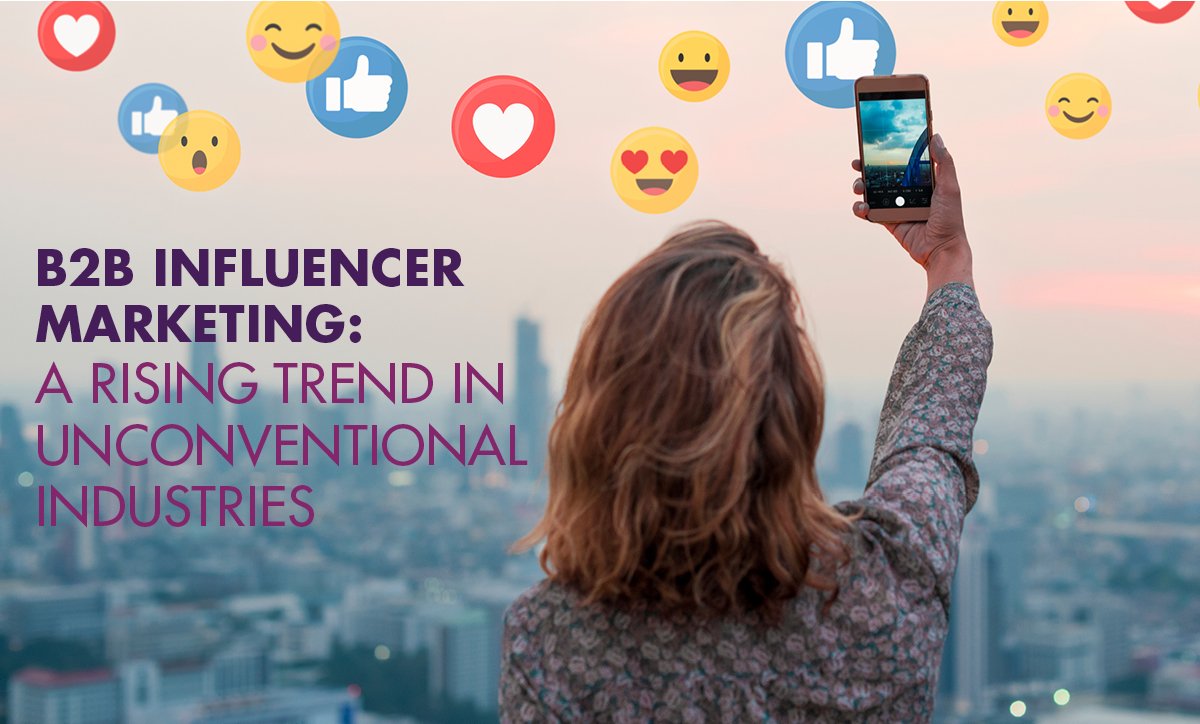In today’s rapidly evolving business landscape, B2B influencer marketing has emerged as a powerful strategy for companies looking to enhance their digital presence and connect with their target audience on a deeper level. Unlike its B2C counterpart, B2B influencer marketing requires a nuanced approach, focusing on building trust, and credibility, and fostering meaningful relationships within niche markets.
Benefits of B2B Influencer Marketing

1. Building Credibility and Trust
In the B2B realm, trust is a cornerstone of successful partnerships. Leveraging influencers who are already established and respected within a specific industry can significantly enhance a company’s credibility. Customers are more likely to trust recommendations from industry thought leaders, facilitating a faster path to conversion.
2. Expanding Reach in Niche Markets
B2B markets are often characterized by their specificity and niche focus. Identifying influencers who resonate with your target audience allows you to tap into these niche markets more effectively. This strategic alignment ensures that your message reaches the right ears, maximizing the impact of your marketing efforts.
3. Driving Lead Generation
One of the primary objectives of any B2B marketing strategy is lead generation. Influencers can play a crucial role in this process by creating content that speaks directly to the pain points and needs of your target audience. This personalized approach increases the likelihood of generating high-quality leads that are more likely to convert.
Identifying the Right B2B Influencers
1. Understanding Your Target Audience
Before diving into the world of influencer marketing, it’s essential to have a deep understanding of your target audience. What are their preferences, challenges, and interests? Armed with this knowledge, you can identify influencers whose content aligns seamlessly with the needs of your audience.
2. Researching Potential Influencers in Your Industry
Not all influencers are created equal, and finding the right ones for your B2B brand requires thorough research. Look for influencers with a genuine passion for your industry, a history of creating valuable content, and a substantial following of engaged professionals. Tools like social media analytics can aid in this selection process.
Building Strong Relationships with B2B Influencers
1. Personalized Outreach Strategies
Approach influencer partnerships as collaborative relationships rather than mere transactions. Personalized outreach is key to establishing a connection with influencers. Communicate why you believe their collaboration is mutually beneficial and how it aligns with their brand.
2. Collaborative Content Creation
The most successful B2B influencer marketing campaigns involve influencers in the content creation process. Whether it’s co-authored blog posts, joint webinars, or collaborative videos, including influencers in the creation of content ensures authenticity and resonance with their audience.
Measuring the Success of B2B Influencer Marketing Campaigns
1. Key Performance Indicators (KPIs) for B2B Influencer Marketing
To evaluate the effectiveness of your B2B influencer marketing efforts, establish clear key performance indicators (KPIs). These may include engagement metrics, lead conversion rates, and brand sentiment. Regularly monitoring these KPIs provides valuable insights into the success of your campaigns.
2. Analyzing ROI and Engagement Metrics
Return on investment (ROI) is a critical metric in any marketing strategy. Analyze the financial impact of your influencer marketing campaigns and compare it to the engagement metrics. A comprehensive understanding of both aspects allows for continuous refinement and improvement.
Common Challenges
1. Authenticity Concerns
Maintaining authenticity is a common challenge in influencer marketing. B2B influencers need to genuinely believe in the products or services they promote to maintain credibility with their audience. Carefully vet influencers to ensure their values align with your brand.
2. Finding Influencers Aligned with Brand Values
Aligning influencers with your brand values is crucial for long-term success. A misalignment can lead to a disconnect with your audience and potential damage to your brand reputation. Thoroughly research influencers to ensure they share your brand’s ethos.
Best Practices for a Successful B2B Influencer Marketing Strategy
1. Setting Clear Goals and Objectives
Before launching any B2B influencer marketing campaign, define clear goals and objectives. Whether it’s increasing brand awareness, driving lead generation, or fostering thought leadership, a well-defined strategy provides direction and measurable outcomes.
2. Creating Compelling Content with Influencers
The heart of B2B influencer marketing lies in the content. Work closely with influencers to create content that resonates with your audience and adds value. Whether it’s in-depth articles, case studies, or video testimonials, prioritize quality over quantity.
Trends and Innovations in B2B Influencer Marketing
1. Emerging Platforms and Strategies
B2B influencer marketing is continually evolving, with new platforms and strategies emerging. Stay abreast of industry trends, such as the rise of LinkedIn as a B2B influencer platform, and explore innovative approaches to keep your campaigns fresh and effective.
2. The Role of Video Content and Live Streaming
Video content has become increasingly popular in B2B influencer marketing. Consider incorporating live streaming sessions, interviews, and product demonstrations to provide valuable, real-time interactions with your audience.
Integration with Overall Marketing Strategies
1. B2B Influencer Marketing as Part of a Holistic Approach
For maximum impact, integrate B2B influencer marketing into your overall marketing strategy. Ensure that influencer efforts align seamlessly with other channels, creating a cohesive and comprehensive brand message.
2. Aligning Influencer Efforts with Broader Marketing Goals
Coordinate influencer activities with broader marketing initiatives. Whether it’s aligning content calendars or synchronizing product launches, a cohesive approach ensures consistency and reinforces your brand message.
Legal and Ethical Considerations in B2B Influencer Marketing
1. Disclosures and Transparency
Maintaining transparency is vital in B2B influencer marketing Communicating any financial arrangements with influencers and ensuring they disclose their partnerships when promoting your products or services.
2. Compliance with Industry Regulations
Be aware of and comply with industry regulations regarding influencer marketing. Legal considerations vary by region and industry, so staying informed and following best practices is essential to avoid legal issues.
Tips for Small and Medium-sized Enterprises (SMEs) in B2B Influencer Marketing
1. Budget-Friendly Approaches
SMEs may have budget constraints, but that doesn’t mean they can’t leverage influencer marketing. Explore cost-effective strategies, such as partnering with micro-influencers or organizing joint events, to maximize the impact of your budget.
2. Leveraging Micro-Influencers
Micro-influencers can be valuable allies for SMEs. While they may have a smaller following, their engagement rates are often higher, making them ideal for niche markets. Identify micro-influencers aligned with your brand and industry.
Future Outlook
1. Anticipated Developments and Trends in the Coming Years
As technology and consumer behavior continue to evolve, B2B influencer marketing is expected to undergo further transformations. Stay attentive to emerging trends, such as the integration of artificial intelligence in influencer selection and the growth of virtual events, to stay ahead of the curve.
Case Study: Leveraging B2B Influencer Marketing for Increased Brand Visibility and Lead Generation
In this digital era, customers depend on influencers’ feedback as a trusted source of information. Which makes it essential for the brand to collaborate with the right suitable influencers to motivate the target customers. A company that offers cutting-edge software solutions faced some challenges in reaching more markets. As they were facing difficulty in increasing the brand awareness for their products and services. Also, they couldn’t differentiate themselves from the other competitors in the market. So the company decided to rely on B2B influencer marketing strategies to solve these problems.
Goal
The main goals of the influencer marketing campaign were:
- Enhance Brand Credibility: The company was aiming to build strong credibility and trust. By depending on famous figures or influencers in the industry.
- Expand Reach in Niche Markets: They needed to expand their reach in the right market. And guarantee that their messages are reaching the right decision makers.
- Drive Lead Generation: The success of the campaign depended on the leads it generated. The leads should be high-quality and turn into customers.
Strategy
- Identifying the Right Influencers
The company started by understanding the target customers and their different characteristics. And identifying the pain points of the decision makers in the tech industry. And conducting in-depth research on the influencers that influence their target audience. They decided to choose influencers with strong industry experience and who have engaged followers from the industry. The influencers that have been chosen were experts in business technology solutions and had worked with other professionals in the field.
- Personalized Outreach and Building Relationships
The company tailored its communication messages to align with the influencer’s values. Instead of reaching generic influencers that don’t align with the campaign values. The company also showed how their product could align with their influencer audience and solve common challenges. By building a strong relationship with the influencers, the company treated them as collaborators. This showed how strong the campaign is, not just using influencers as a promotional tool.
- Collaborative Content Creation
The content creation process was done through a collaboration between the influencer and the company. To be able to generate the right suitable content for the target audience. This includes webinars, blog posts, and real-world case studies. To showcase the real values of the products to the target audience through the influencers. Also, the influencers were able to share their opinion and feedback as long as it aligned with their branding. Which builds trust with the audience, as it felt like true feedback, not a sponsored one
- Leverage Video Content and Live Streaming
By recognizing the importance of video content, the company adopted it in the campaign. As influencers hosted a live stream video, allowing the audience to ask questions to answer them and discuss the new industry trends. This real-time interaction allows the company to present the power of its products, leading to an increase in engagement. Helping in building a better connection between the brand and its target audience.
Conclusion
In conclusion, B2B influencer marketing is a dynamic and effective strategy for businesses aiming to establish a strong online presence, build credibility, and drive meaningful engagement. By carefully selecting and collaborating with influencers, setting clear goals, and staying abreast of industry trends, businesses can unlock the full potential of B2B influencer marketing.
As you delve into the realm of B2B influencer marketing, remember that the right strategies can propel your brand to new heights. To explore how AIM Technologies can further enhance your marketing endeavors, we invite you to request a personalized demo. Witness firsthand the power of cutting-edge solutions tailored to meet your unique needs.
Ready to revolutionize your B2B marketing? Request a demo from AIM Technologies now!
FAQs
How do I find the right B2B influencers for my industry?
- Finding the right B2B influencers involves a combination of audience research and influencer vetting. Look for individuals with a genuine passion for your industry and a history of creating valuable content.
What key performance indicators (KPIs) should I focus on when measuring B2B influencer marketing success?
- Key performance indicators (KPIs) may include engagement metrics (likes, comments, shares), lead conversion rates, and brand sentiment analysis.
How can SMEs leverage influencer marketing with limited budgets?
- SMEs can explore budget-friendly approaches, such as partnering with micro-influencers, organizing joint events, and focusing on niche markets.
What legal considerations should I be aware of in influencer marketing?
- Ensure transparency by disclosing financial arrangements with influencers. Additionally, stay compliant with industry regulations regarding influencer marketing to avoid legal issues.
What trends can we expect to see in B2B influencer marketing in the future?
- Anticipated trends include the integration of artificial intelligence in influencer selection, the growth of virtual events, and continuous innovations in content format




